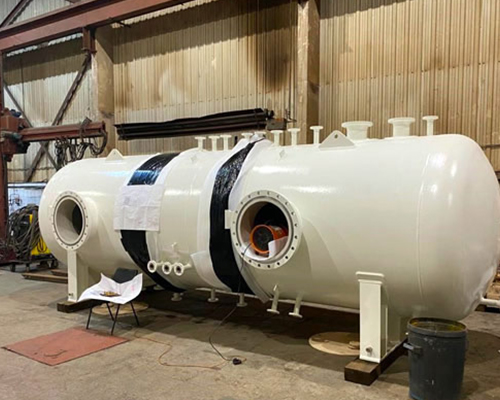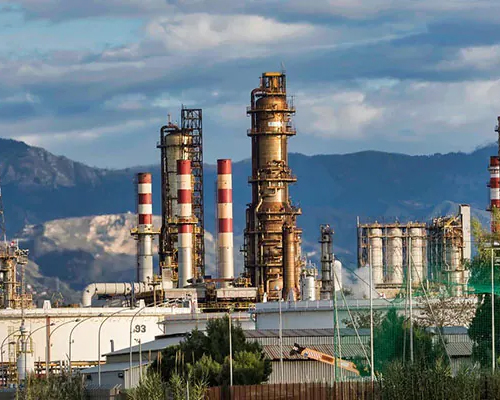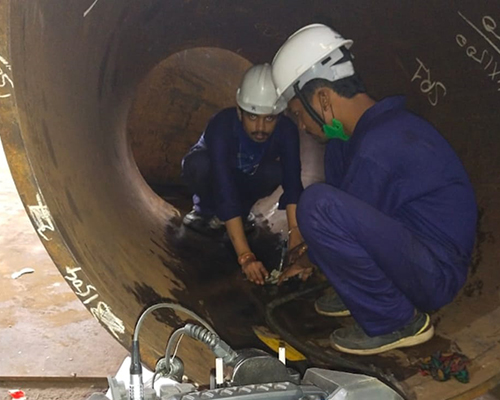Industrial Services (Downstream / Midstream)
Sharptest is a trusted provider of non-destructive testing (NDT) and American Petroleum Institute (API) inspections for storage tanks, pipelines, boiler, heat exchanger and pressure vessels in the various industry including oil & gas, chemical and power generation. Our team of highly skilled experienced professional technicians uses the latest technology and techniques to ensure the safety and reliability of these critical infrastructure components.
NDT Inspection:
We offer a comprehensive range of NDT inspection services, utilizing state-of-the-art equipment and techniques such as ultrasonic testing, magnetic particle inspection, visual inspection, eddy current testing, MFL, advance non-destructive testing and more. Our inspections help clients identify any defects or damage to their equipment, enabling them to take proactive measures to maintain the integrity of their equipment and prevent costly downtime or environmental incidents.
API Inspection:
In addition to NDT inspection services, we offer API inspection services for various equipment including storage tanks, pipelines, boiler, heat exchanger and pressure vessels. Our certified inspectors have extensive knowledge and experience in conducting API 510, 570, and 653 inspections. Can help clients comply with industry standards and regulations, while also ensuring the safe and efficient operation of their equipment. Safety and Quality: At Sharptest , safety and quality are our top priorities. We adhere to strict safety protocols and procedures to ensure the well-being of our employees and clients, and we maintain rigorous quality control measures to ensure the accuracy and reliability of our inspection data. Our commitment to safety and quality has earned us a reputation as a trusted partner in the oil and gas industry.
- Storage Tank, Pressure Vessels, Pipeline NDT & Inspection
- Boiler, Heat Exchangers, Fin fan Cooler NDT & Inspection
- Lifting Equipment NDT & Inspection
- Structural Products and Equipment Inspection
- Shutdown Projects Inspection & NDT.
- CNDT Services (RT, VT, UT, UTG, MT, PMI, PT, HT,)
- ANDT services (PAUT, TOFD, ECT, RFT, LRUT, PECT, AE, MFL, DRT.)
NDT involves the use of various methods to detect and analyze any defects or flaws in the tank's materials or structure without causing any damage. Common NDT methods used in tank inspection include ultrasonic testing, radiography, magnetic particle testing, and visual inspection. Advance NDT goes beyond conventional NDT methods to use more advanced techniques, such as computed tomography (CT), phased array ultrasonic, eddy current testing, and laser shearography. These methods provide a more detailed and accurate analysis of the tank's condition, allowing for better decision-making and more effective maintenance and repair.
API inspection is a standardized procedure used to evaluate the integrity of tanks and ensure they meet industry safety standards. The API 653 standard specifically covers the inspection, repair, alteration, and reconstruction of aboveground storage tanks used for petroleum products, chemicals, and other liquids.
During an API inspection, a qualified inspector examines various aspects of the tank, including its foundation, shell, roof, and appurtenances, to check for any damage or corrosion. The inspection also includes a review of records and maintenance history, as well as an assessment of the tank's suitability for continued use.
Both NDT, Advance NDT, and API inspection are important tools for maintaining the safety and reliability of storage tanks in the oil and gas industry. Regular inspections can help prevent accidents, minimize downtime, and prolong the lifespan of the tank. The use of Advance NDT techniques can help identify potential issues before they become a serious problem, allowing for timely and cost-effective repairs. Bottom of Form

Pipelines are critical components of many industrial processes, and ensuring their safety and reliability is essential. Non-Destructive Testing (NDT) is a method of inspecting pipelines without causing any damage to the material.
There are different types of NDT techniques, including visual inspection, radiography, ultrasonic testing, magnetic particle testing, liquid penetrant testing, and eddy current testing. Advanced NDT techniques such as phased array ultrasonics, time-of-flight diffraction, and guided wave testing can provide more detailed information about pipeline defects.
API Inspection refers to the inspection and evaluation of pipelines based on the standards set by the American Petroleum Institute (API). The API provides guidelines for inspection and maintenance of pipelines to ensure their safety and reliability. In a pipeline inspection process, NDT techniques are used to detect any defects or abnormalities in the pipeline, such as cracks, corrosion, or other types of damage. The results of these inspections are then evaluated based on the API standards to determine the severity of any defects and the necessary repairs or maintenance.
Overall, the combination of NDT techniques, advanced NDT methods, and API inspection standards is crucial for ensuring the safety and reliability of pipelines in industrial processes.
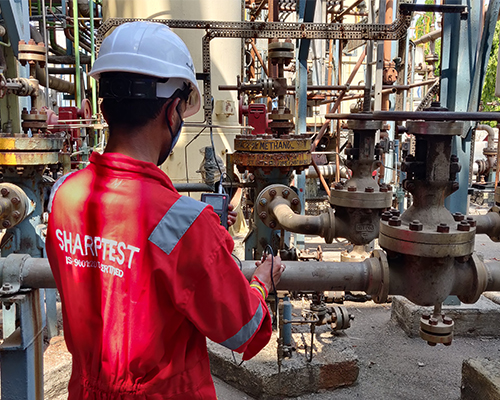
Boiler inspection NDT (non-destructive testing) refers to the use of techniques that do not damage or alter the material being inspected, to detect and evaluate any defects or irregularities in boilers. Common NDT methods used in boiler inspection include visual inspection, ultrasonic testing, radiographic testing, magnetic particle testing, and liquid penetrant testing.
Advance NDT techniques refer to more sophisticated and advanced NDT methods that use advanced technologies and equipment to detect and evaluate defects or irregularities that may not be detectable through traditional NDT methods. Examples of advance NDT techniques include phased array ultrasonic testing, eddy current testing, and thermography.
API inspection refers to the inspection of equipment and structures, including boilers, according to the standards set by the American Petroleum Institute (API). The API has established various inspection standards, including API 510 (Pressure Vessel Inspection Code), API 570 (Piping Inspection Code), and API 653 (Tank Inspection, Repair, Alteration, and Reconstruction). These standards provide guidelines for the inspection, repair, and maintenance of equipment used in the oil and gas industry to ensure their safe and reliable operation.
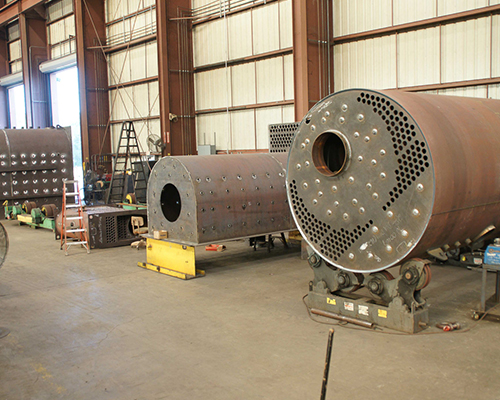
Heat exchanger inspection is a critical aspect of maintaining and ensuring the efficient operation of heat exchangers in various industries such as chemical, petrochemical, and power generation. Non-destructive testing (NDT) techniques are commonly used for heat exchanger inspection.
Advanced NDT techniques are used to inspect heat exchangers to detect internal and external defects that may not be visible with conventional NDT methods. These advanced techniques include ultrasonic phased array testing, eddy current testing, remote visual inspection, and digital radiography.
API inspection refers to inspection procedures that comply with American Petroleum Institute (API) standards. API inspection is commonly used in the oil and gas industry to ensure the integrity and safety of equipment, including heat exchangers. API inspection includes visual inspection, non-destructive testing, and other techniques to detect and evaluate defects or degradation in the equipment.
In summary, heat exchanger inspection is essential, and NDT techniques play a critical role in detecting defects and ensuring the safe and efficient operation of heat exchangers. Advanced NDT techniques can provide more accurate and detailed information about the condition of the heat exchanger, and API inspection procedures can help ensure compliance with industry standards and regulations.
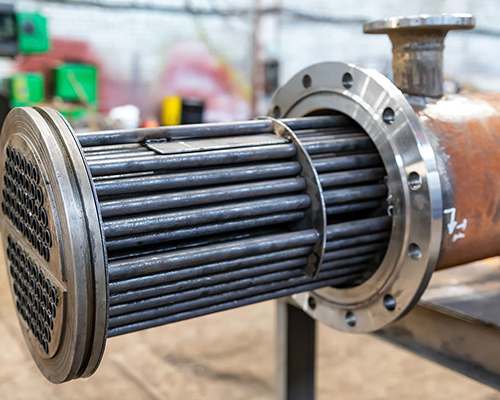
Pressure vessel inspection involves the evaluation of the integrity of the pressure vessel, including its components and accessories, to ensure that it can safely withstand the operating conditions and prevent any potential leaks or failures. This inspection is typically done by qualified inspectors who follow established codes and standards such as ASME Boiler and Pressure Vessel Code, API, and National Board Inspection Code.
Non-Destructive Testing (NDT) is a method of inspecting materials and components without causing damage to them. NDT techniques such as ultrasonic testing, radiography, magnetic particle testing, and liquid penetrant testing are used to detect flaws or defects in pressure vessels that could compromise their safety and reliability.
Advanced NDT techniques, such as phased array ultrasonic testing, computed tomography, and laser-based inspection, are used when traditional NDT methods are insufficient or cannot detect certain types of defects. These techniques can provide more detailed and accurate information about the condition of the pressure vessel and help identify potential issues before they become critical.
API inspection is a specific type of pressure vessel inspection that follows the guidelines established by the American Petroleum Institute (API). API inspection covers the design, fabrication, installation, maintenance, and repair of pressure vessels used in the oil and gas industry. In summary, pressure vessel inspection, NDT, advance NDT, and API inspection are all critical processes that help ensure the safety and reliability of pressure vessels. These inspections must be performed by qualified personnel using established codes and standards to identify potential issues and prevent failures that could result in injury, damage, or loss of life.
